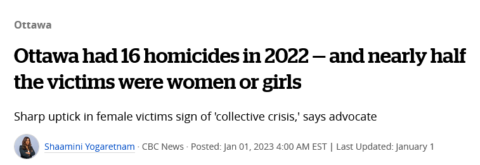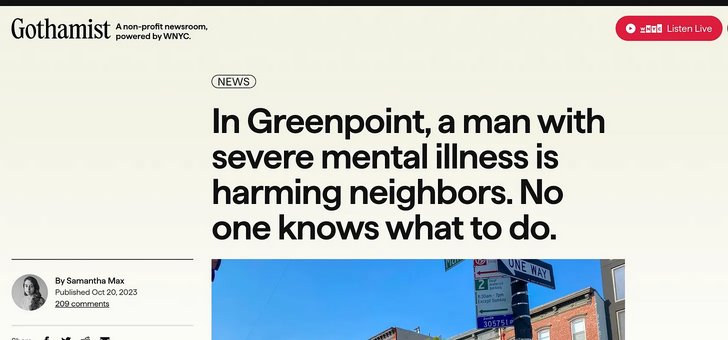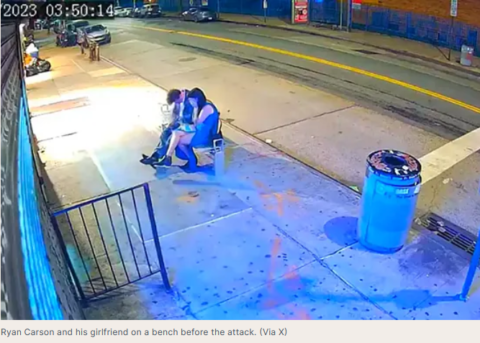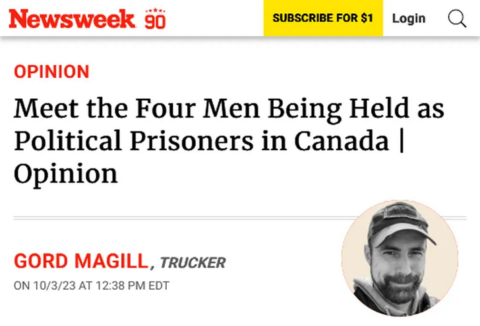Tom Scott
Published 28 Nov 2016In Gävle, Sweden, every year they build Gävlebocken, an enormous traditional Swedish Christmas straw goat. And every year, someone tries to burn it down. Here’s to holiday traditions.
(more…)
December 26, 2023
Arson as a Christmas Tradition: The Gävle Goat
December 8, 2023
QotD: Prices as information
Price = information, gang. Adam Smith said that any item’s real value is what its purchaser is willing to pay, and this is exactly the kind of thing he was talking about.
Let’s all take another huge toke and return to our Libertarian paradise, where all conceivable information is both completely accurate and totally free to circulate. And since we’re now all so very, very mellow, let’s give Karl Marx due credit. One of his main gripes with “capitalism” is that it “commodifies” everything. Everything has its price under “capitalism”, Marx said, even stuff that shouldn’t – human life, human dignity. Since this is a college classroom and I’m the prof, I can assign some homework. Go google up “kid killed over sneakers”. You can always find stories like that. Put your natural, in-many-ways-admirable young person’s urge to rationalize aside, and simply consider the information. What were those Air Jordans really worth, based on the stuff we’ve learned today?
See what I mean? Marx had a point. What are those sneakers worth, considered from the standpoint of “demand”? Obviously more than whatever a human life is worth, considered from the same standpoint. Hence Marxism’s enduring appeal to young people whose hearts are in the right place. “Commodificiation”, or “reification” as he sometimes called it, is very real, and very nasty …
Severian, “Velocity of Information (I)”, Founding Questions, 2020-12-26.
December 5, 2023
“Why should a criminal act be punished more or less severely depending on a victim’s ability to emote in public about it?”
Janice Fiamengo with a column that, had it been written by a man, would merit universal condemnation from the mainstream media (instead, if they pay any attention to it will probably dismiss it with hints of “false consciousness” or “Stockholm syndrome”):
For years, activists told us that part of the horror for sexual assault survivors was the fear of not being believed, the feeling that one was alone with an experience no one else understood or even acknowledged. Fair enough. Now, decades into the near-constant discussion of all varieties of such assault, many quite trivial yet treated with great seriousness, women don’t seem to have become any better at dealing with the ostensible horror — quite the opposite. The unending focus on sexual victimization seems only to have created more victims.
A case in point involves the infamous sexual crimes of Dr. Vincent Nadon, a now-disgraced GP at the University of Ottawa Health Clinic, who in late 2018 was sentenced to eight years in prison after he pled guilty to many dozens of counts of voyeurism and sexual assault during a 28-year medical practice. (The exact number of charges was hard to determine, seeming to change in every report). Much of what Nadon pled guilty to — mainly the recording of women via his cellphone while they were undressing or undergoing breast exams — was a type of deeply unprofessional conduct that might have gone forever unnoticed by the victims if one intrepid woman had not seen the cellphone’s recording light winking at her from a cabinet and gone to investigate. There were also allegations of sexual assault nearly indistinguishable in their details from regular medical touching — the main distinction being that the touching was “for sexual purposes”. Witnesses at Nadon’s sentencing hearing spoke of what had occurred, in some cases many years previously, as if it had been the worst possible betrayal.
A report of the sentencing hearing described women wiping away tears as they told of “feelings of powerlessness, embarrassment and even guilt”. Others said they had become distrustful of men after learning of Nadon’s actions. One woman, having been shown by police a cellphone recording made of her in Nadon’s office, claimed that she felt physically ill and “has not been able to go to another doctor, and is uncomfortable undressing, even in front of her husband”. Another woman said she felt “violated and betrayed”, and now “looks for hidden cameras everywhere, is obsessed with locking doors, and has developed a medical condition that can be caused by stress”. Many alleged that they feared seeing videos of themselves on the internet though there is no indication Nadon ever uploaded any of his recordings.
In a separate report about fallout from the charges against Nadon, some women expressed outrage at authorities they saw as complicit in their victimization, with one woman complaining that University of Ottawa Health Services failed to “help [her] tell [her] story and come forward”. This woman, who told how she had not been provided with a gown to wear during a pap smear procedure with Nadon, was also furious at the University of Ottawa for failing to more closely monitor its health service provider. Her anger was sustained and wide-ranging: “Obviously I’m super traumatized. I feel extremely violated and so sick to my stomach. It’s really, really disgusting.” “It’s even hard for me now to find a therapist I can trust.”
I can’t get inside these women’s heads, of course, but their statements seem hysterical and irrational, far in excess of the facts, and perhaps willfully exaggerated in order to garner the maximum of attention and sympathy. It was disturbing to see such statements presented as if they proved something about the severity of Dr. Nadon’s actions. They prove nothing except the climate of alleged female sexual fragility in which we are all now forced to live.
Victim impact statements are often of dubious value in criminal justice proceedings — why should a criminal act be punished more or less severely depending on a victim’s ability to emote in public about it? — but in a case like this, with damsel-in-distress melodrama having already been stoked by multiple media reports at every stage of the investigation, the victim statements took on a particularly staged, formulaic quality. One had to make an effort to remember that many of the complainants would not even have known they were harmed if police hadn’t shown them that they were. Their pain may have been real, but it was also almost entirely self-generated.
The whole story of Dr. Nadon the beloved physician turned super-predator seems to have been largely manufactured, first and foremost by police, who were so eager to find as many complainants as possible that they repeatedly put out calls through the media for more “victims” to come forward. I’ve never seen anything quite like it, with police stating publicly that they feared there were likely more victims, and issuing “a public plea for help”. What did they expect to happen?
November 25, 2023
“It’s not called the gender empathy gap for nothing”
Janice Fiamengo on the blatant disregard for violence as long at that violence is not directed at women:
The news headline by the CBC, Canada’s state-funded broadcaster, could hardly have been more blatant: “Ottawa had 16 homicides in 2022—and nearly half of the victims were women or girls“. In other words, more than half of the victims, as is always the case, were boys and men, a state of affairs that no one at the CBC has ever found troubling enough to lament or even notice. Only when the female homicide rate approaches gender parity in one (unusual) year is it a “collective crisis”, as the subheading alleges.
It’s not called the gender empathy gap for nothing.
[Author’s note: Perhaps I should have stopped here. What more is there to say about the extraordinary indifference of most people, men and women, to violence against men and the craven desire to deny female culpability? There’s nothing new in this essay, no new angle or stats, no rousing call to action, nothing beyond the marshalling of dreary evidence and sadly sarcastic observations unlikely to change any mind or cause any gynocentric cheek to blush. I had intended to finish it in time for the International Day for the Elimination of Violence Against Men, on November 18, but was stymied partly by a sense of helpless anger, the weight of which pressed down on every sentence. The section at the end, about the death of Benjamin Rain, was the last straw.]
Feminists have long touted their concern for victims, yet that is never in shorter supply than in their one-sided discussions of violence, in which the only deaths allowed to matter are female deaths, presented for readers’ contemplation with poignant circumstances, names, and expressions of horrified sadness, as in the above-mentioned article. Dead men remain largely anonymous, and few readers could guess from the typical reports of feminist organizations that women are ever lethally violent.
Indifference to male suffering and death are the norm all over the world, of course, but the Anglophone feminist movement has markedly increased it, fudging numbers and manipulating language to focus empathy exclusively on women and girls. The CBC article devotes significant space to discussing the risible concept of femicide, a relatively recent coinage that makes no secret of its female supremacism, purporting to highlight how women and girls are killed “simply for being women” and “primarily by […] men”, as if every woman, even one killed by accident (as we’ll see), is evidence of gender bias.
The idea that women are killed because they are women is preposterous, impossible to support with evidence, and obviously intended to solidify the impression that women outnumber men as victims of murderous violence. An organization called the Canadian Femicide Observatory for Justice and Accountability provides an elaborate taxonomy of forms of femicide to drive the idea home, deliberately blurring the lines between intimate partner homicide, a favored focus, and other killings of women, which are collectively deplored as “brazen acts of hatred“.
Even a cursory reading of the details, however, exposes the vacuousness of the terminology as well as the sleight of hand by which men’s alleged misogyny is misleadingly linked to the totality of the women’s deaths. Only two of Ottawa’s seven murdered women were killed by current or former intimate partners. One of the dead women was attacked and killed by her two adult daughters (an act called “non-intimate femicide”), while another was the victim of a stray bullet that killed her by accident and was probably intended for a man (if you can believe it, the Canadian Femicide Observatory calls this type of death “associated/connected femicide”).
It is impossible to conclude that all or even most of these — certainly unfortunate — deaths can logically be said to have occurred, as the mantra holds, “due to the existence of gender norms and stereotypes, discrimination directed toward women and girls, and unequal power relations across genders“. The determination to find gender discrimination at the root of all female suffering — and thus to justify yet more programs, initiatives, and taxpayer dollars for feminist organizations, as well as more collective shaming of men — seems unstoppable.
November 8, 2023
Reality will continue to be real long after you can keep on denying it
But, as Chris Bray illustrates, some people have truly heroic reality-denial complexes going on and they want you to deny reality along with them:
Hey, look, it’s the zeitgeist.
No one knows what to do. About this:
Court records show the man who pushed Whitcomb currently faces charges ranging from harassment and menacing to assault and illegal possession of a knife. He has also been accused of groping and assaulting women on the north side of the neighborhood and is on the state’s sex offender registry for forcible touching and sexual abuse convictions in 2017 and 2021.
He hurts people a lot, and he’s a registered sex offender, and he sometimes carries a knife, and he walks up to strangers on the street and just hurts them for no reason, and he especially likes to hurt women quite a lot, especially in ways that seem pretty consistently sexual. It’s … complicated. Hard to know what to do!
Note that the story takes care to avoid identifying the person the story is about, because the reporter is concerned that identifying the serial aggressor will make it possible for someone to hurt him: “Gothamist has chosen to withhold the man’s name because of his mental illness and because he is at risk of additional attacks by people who want to take matters into their own hands”. And hurting people is wrong. To prevent attacks, see, you don’t tell people the name of a person who keeps … attacking.
The story warns that the constant aggression of [unnamed person] is a warning about “the systemic failures that allow people to fall through the cracks,” because what a man hurting people over and over again shows us is that the man who’s being forced to hurt all those people by society’s deep cruelty isn’t getting enough services. Greenpoint, an increasingly expensive neighborhood in Brooklyn, is represented by “some of the city’s most progressive lawmakers”, but they’re still struggling with these hard questions. America in 2023, ladies and gentlemen.
But finally, as a test of the reporter’s good faith, we get a broader description that contextualizes the problem. There are a lot of people in New York City who are being forced to hurt other people because they aren’t being given enough services, and here comes a famous example: “Earlier this year, Daniel Penny fatally choked Jordan Neely, a beloved Michael Jackson impersonator who Penny said was ‘going crazy’ and acting aggressively toward fellow subway riders.”
That’s it — that’s the whole description. Who was Jordan Neely? He was a man who impersonated Michael Jackson, and he was loved a whole lot, but then for some unaccountable reason Daniel Penny claimed the beloved man was going crazy, so he just suddenly killed the poor man. It’s strange that this Penny person would say something like that, right?
Now, in a city of eight million people, Jordan Neely was on a list, kept by the city government, of the fifty homeless people whose behavior is most persistently troubling. His case was regularly monitored by the “Coordinated Behavioral Health Task Force”, which “consists of workers from across city government, including the departments of Health, Homeless Services and Hospitals, along with representatives of the nonprofits that the city contracts with to try to connect homeless people to shelter and services, a process known as outreach”. At the time when the mean Daniel Penny suddenly killed him for no reason, Neely had an active arrest warrant. And other passengers in the subway car said that — well, let’s turn to the headline in the New York Times: “Witnesses in Subway Chokehold Case Describe Fears of Death and Violence“.
October 16, 2023
The Allied Rape Wave of 1944 – War Against Humanity 116
World War Two
Published 12 Oct 2023Since the earliest days of humanity, where there has been war, there has been rape. This war is no different. As vast armies battle across Europe, the chaos in their wake breeds an epidemic of rape. In its action and its punishment the European rape wave is also highly racialised. It adds up to a storm of suffering.
(more…)
October 8, 2023
October 7, 2023
“Many people who hold ‘luxury beliefs’ … are oblivious to the consequences of their views”
Rob Henderson, guest-posting at The Free Press, illustrates several recent examples of well-connected people holding what he coined as “luxury beliefs” being suddenly introduced to the real-world consequences of their beliefs:
Recently, two high-profile supporters of “justice reform” were murdered.
At 4 a.m. on Monday, Ryan Carson, a 32-year-old social justice and climate change activist, was walking with his girlfriend in Bedford–Stuyvesant, Brooklyn, when he was stabbed to death by a stranger. Only a few hours earlier in Philadelphia, activist and journalist Josh Kruger was shot and killed in his home.
And two Democratic lawmakers who voted to “redirect funding to community-based policing reforms” have been recent victims of violent crime.
On Monday night, blocks away from the Capitol in Washington, D.C., Congressman Henry Cuellar was carjacked by three armed men. (The lawmaker survived the incident unscathed.) In February, Angie Craig was attacked in an elevator at her apartment building in Capitol Hill. A homeless man demanded she allow him into her home to use the restroom, then he punched her and grabbed her around the neck. She escaped after throwing hot coffee on him.
Of course, these people did not deserve harm because of their support for soft-on-crime policies. But I’ve long argued that many people who hold “luxury beliefs” — ideas and opinions that confer status on the upper class, while often inflicting costs on the lower classes — are oblivious to the consequences of their views. Support for defunding the police is a classic example.
Luxury beliefs can stem from malice, good intentions, or outright naivete.
But the individuals who hold those beliefs, the people who wield the most influence in policy and culture, are often sheltered when their preferences are implemented.
Some online commenters have said that my luxury beliefs thesis is undermined by these tragic events, because the victims were affluent and influential — and they still suffered the consequences of their beliefs.
But the fact remains that poor people are far more likely to be victims of violent crime. For every upper-middle-class person killed, 20 poor people you never hear about are assaulted and murdered. You just never hear about them. They don’t get identified by name in the media. Their stories don’t get told.
October 5, 2023
“Canada, where truck drivers are Nazis and Nazis are war heroes”
Donna LaFramboise on the “Coutts Four” — bona fide political prisoners of the Canadian state:
Gord Magill has a lengthy article over at Newsweek titled Meet the Four Men Being Held as Political Prisoners in Canada. These individuals are jointly accused of conspiring to murder police officers during a protest in Coutts, Alberta around the same time that the Freedom Convoy truckers were in Ottawa.
That’s a very serious charge, of course, but evidence appears scarce. I’ve not personally investigated this matter, but a former Toronto police detective named Donald Best has. In July, he outlined a long list of concerns, in addition to pointing out that “Everybody makes bail in Canada” — including the man “currently accused of the first degree murder of Toronto Police officer Jeffrey Northrup”.
Yet the Coutts men — three of whom have no criminal record — have been held without bail for nearly 600 days. Since they are legally innocent until proven guilty, this is horrifying.
As Gord writes in Newsweek, we are a country in which hard-working Canadians are called Nazis by the same Prime Minister whose government recently recognized an actual Nazi with a standing ovation in the House of Commons. What a strange state of affairs.
After speaking to each of the Coutts four, Gord provides a wealth of new info about them. These are working class guys — a power lineman, the owner of a small construction company, a master electrician, and a contractor. Three of them have children as young as 9, 10, and 11. Gord says only two of them “knew each other prior to their arrest”. It’s difficult to imagine a more unlikely group of cop-murder conspiracists.
September 19, 2023
QotD: Logical consistency isn’t their jam
The same people who last week were screeching about the government having concentration camps now want me to give my AR15s to that same government.
The same people who last month were hyperventilating about the government slaughtering black people now expect me to surrender my guns to that same government.
The same people who last year were setting stuff on fire and yipping about the government rounding up the gays and Muslims for liquidation now think it’s a good idea for me to just hand over my rifles to that same government.
You chuckleheads need to make up your damned minds.
Lawdog, “You know what I find …”, The Lawdog Files, 2019-08-07.
September 9, 2023
The Republican race – “There don’t seem to be a lot of takers for ‘pretending this is normal'”
Mark Steyn on the establishment GOP’s attempt to run the 2024 campaign as though nothing has changed other than the calendar:
I mentioned on Monday that on his long-running Radio Derb John Derbyshire drew his listeners’ attention to an observation of yours truly:
I can’t improve on Steyn — nobody can — so I’ll just quote him from that piece.
I always feel Derb thinks I’m a bit of a pantywaist on the hardcore issues, but in today’s America even a reasonably sentient pantywaist should be able to get to the nub of the issue. Here’s the bit Derb quoted:
So two years later the American Right still talks about the justice system and the election campaign as if either term means what it does in functioning societies. As I said above, I don’t intend to comment on this week’s Trump indictment either, nor do I wish to talk about who would make the best president, who has the best platform, who has the skill-set to implement the platform … That would be all well and good if we were in, say, France, but, when the dirty stinking rotten corrupt U.S. justice system is criminalizing political opposition, there’s no point pretending this is a normal situation, right?
“There’s no point pretending this is a normal situation, right?” And yet at least three-quarters of the candidates in that Republican debate insisted on doing just that: This is just a normal quadrennial election in the greatest country in the history of countries where we’re renowned around the planet for our uniquely peaceful “peaceful transfer of power”, etc, etc.
Sorry, I don’t buy that — and evidently nor does the GOP base. Which is why Trump has a forty-point lead over his nearest rival, and Nikki Haley’s alleged triumph on stage in that debate has seen her numbers soar to — stand well back! — 6.1 per cent. The avowedly normal vice-president, senator and three governors nipping at her heels can barely muster ten percent between them. There don’t seem to be a lot of takers for “pretending this is normal”.
John Derbyshire quoted me in the context of the latest sentences on the January 6th “insurrectionists”. Dominic Pezzola broke a window at the Capitol and was given ten years; the government had asked for twenty. Joseph Biggs moved a crowd-control barrier and was sentenced to seventeen years; the government had wanted him banged up for thirty-three.
So the prosecutors and the judges seem to have reached a cozy understanding that, whatever sentence the former demand, the Court will be totally reasonable and cut in half. You want another? The feds demanded thirty years for Zachary Rehl; the judge gave him fifteen. And this is after two-and-a-half years in gaol awaiting their “constitutional right” (don’t wave that constitution at me!) to a speedy trial.
Oops, wait, I spoke too soon. The US Attorney wanted thirty-three years for Proud Boys leader Enrique Tarrio, but this time the judge decided to up it to two-thirds of the feds’ demand: twenty-two years. For a guy who wasn’t in Washington on January 6th.
All this of course in an ugly and violent land where actual career criminals who like to beat up disabled women with their own canes have the run of the playground. And with the connivance and support of the Democrat Party, even when very occasionally it all goes wrong for one of their own.
Oh, well. Mr Tarrio is a Proud Boy. I’m not really a Proud Boys type, if only because their founder, Gavin McInnes, has been a bit of an arse about me re Cockwombling Cary Katz and the CRTV cases. Still, I’m all about first principles — and a decade for breaking a window is not, even by lousy American standards, the verdict of a “justice” system.
September 7, 2023
The not-at-all hidden authoritarian desires of the climate activists
Brendan O’Neill on the increasingly blatant wish of the comfortable greenies to impose actual judicial punishment on those who disagree with their agenda:

“Palace of Westminster”by michaelhenley is licensed under CC BY-NC-SA 2.0
Greens have been dreaming about jailing “climate criminals” for a very long time. Climate-change deniers in particular will “one day have to answer for their crimes”, said eco-author Mark Lynas a few years back. Well, Gaia’s authoritarian army might finally be getting its way. The new Energy Bill currently before the UK House of Commons provides for “the creation of criminal offences”, possibly including jail time, where there is “non-compliance” with energy-saving regulations. Shorter version: keep the lights on for too long and you could end up in the slammer.
The Telegraph is reporting that property owners who fail to adhere to “energy-performance regulations” could “face prison” under the government’s crazy plans. There is concern that homeowners, landlords and business bosses could be whacked with fines of up to £15,000 or a year behind bars if they fall foul of regulations on energy consumption. The government says it has no plans to make it a crime to be an eco-unfriendly user of light and heat, but the bill allows for the creation of such crimes. And this has rattled some MPs. They’re concerned that ministers would be able to “create new offences with limited parliamentary scrutiny” thanks to the new bill.
What is the aim of all this tightening of the screws on energy use? Of the possible future criminalisation of us thieves of heat and light? To help Britain reach its Net Zero targets, of course. Like other Western nations, we’re committed to achieving Net Zero emissions by 2050. And if that means strongarming the little folk into reducing their energy use, so be it. Let’s be clear about what the new bill’s provision for the creation of crimes really represents: the state threatening to punish anyone who refuses to convert to the religion of Net Zero and to sacrifice their energy to the jealous god of environmentalism.
We can now see the iron fist in the green glove. There’s been a creeping criminalisation of eco-disobedient behaviour for some time now. In the UK, we’ve had “rubbish police” looking through people’s bags of trash and slapping them with a £100 fine if they are not properly recycling plastic and paper. Under Low Traffic Neighbourhood schemes, officious local councils erect eyesore bollards to stop people from driving on certain roads, and fine them if they fail to comply. In recent years, more than a million such fines have been served on defiers of the LTN regime, raising more than £100million for the Net Zero cultists who rule over us.
Then there’s London mayor Sadiq Khan’s Ultra Low Emission Zone (ULEZ), now expanded to cover every inch of London. Hundreds of cameras have been installed across the capital, a vast infrastructure of Stasi-like watchmen, to ensure that drivers of “dirty” vehicles have paid the daily ULEZ toll of £12.50. A fine of £500 awaits any driver of a sinful car who hasn’t. To those saying “Of course the government isn’t going to fine people for un-green behaviour!”, wake up – officialdom has been doing this for years.
August 5, 2023
The Anglo-Scottish “Debatable Lands”
In the visible portion of this post on the history of the Debatable Lands, Ed West considers the differences between national heartlands and the borders:
Border regions tend to be different, something I thought about during the summer before Brexit when we underwent a mammoth trip across five of those six countries (we never got around to Luxembourg, for which apologies). The journey from Alsace to Baden-Württemberg, or Liguria to Provence, brings home how nationality is often a matter of gradations and unnatural boundaries imposed on the whims of bureaucrats in distant capitals – often more alien than supposed foreigners across the border.
But once you leave that tunnel, things are different; there is no ambiguity between Calais and Dover, only ocean. You’re either in England or France. The same is not true of England’s northern frontier, Britain’s great zone of ambiguity, and in particular the area between Carlisle and Langholm which has historically been known as the “Debatable Land” – the subject of Graham Robb’s book.
Robb, an Anglo-Scot who mostly writes about France, moved back to this part of Britain in the 2010s, and describes it with his characteristic style of history, personal narrative and social commentary.
The border people are a unique subset of the English nation, being the last to undergo the pacification of government. Until the Union of Crowns in 1603, the region’s unusual position outside the orbit of either London and Edinburgh helped create a culture that was clannish and marked by violent feuds and cattle rustling.
Among the notorious Borderer clans were the Scotts, Burns and Irvines north of the border, and Fenwicks, Millburns, Charltons and Musgraves on the English side, while some could be found on both, among them the Halls, Nixons and Grahams. Many of these clans were outlaws and some were lawmen; others were both or either, depending on circumstances.
This proto-Wild West produced many characters, and among the famous border reivers of legend were men such as Archie Fire-the-Braes, Buggerback, Davy the Lady, Jok Pott the Bastard, Wynkyng Will, Nebless [noseless] Clem, Fingerless Well and Dog Dyntle [penis] Elliot.
“Debatable Land” most likely comes from batten, common land where livestock could be pastured, and it was this pastoral economy which shaped their psychology: the importance of honour, and a reputation for violence and revenge, as a deterrent against predators.
Violence was so common on the border that there sprung a tradition whereby truces were arranged in return for “blackmail”, a tribute to border chiefs, from the Middle English male, tribute; only in the nineteenth century did this come to mean any sort of extortion.
Another of the Borderers’ contributions to our language is “bereaved”, which is how you felt after the reivers had raided your land (it usually meant to have lost property rather than a loved one). Other local terms were less successful in spreading, such as “scumfishing”, which meant “surrounding a pele tower with a smouldering heap of damp straw and smoking out its inhabitants”, as Robb put it.
Border folk relied heavily on the protection of their clan, and so “for a reiver, the greatest disgrace was not excommunication but ostracism: if a man failed to keep his word, one of his gloves or a picture of his face was stuck on the end of a spear or a sword and paraded around at public meetings. This ‘bauchling’ was considered a punishment worse than death.”
Both the kings of England and Scotland regarded them as a nuisance. In 1525, the Archbishop of Glasgow excommunicated the reivers en masse; Parliamentary decrees issued by authorities in England and Scotland between 1537 and 1551 stated that “all Englishmen and Scottishmen are and shall be free to rob, burn, spoil, slay, murder and destroy, all and every such person and persons, their bodies, property, goods and livestock … without any redress to be made for same”.
In the 1580s the border area remained “verie ticklie and dangerous”. One adviser even urged Elizabeth I to build another Roman wall because he believed the “Romaynes” had built theirs to defend themselves “from the dayly and daungereous incurtyons of the valyaunte barbarous Scottyshe nation”.
July 27, 2023
QotD: The causes of crime in Britain
I had noticed before that rain improves the behavior of young British people: It discourages them from leaving their homes. Rain is also the best, almost the only, prophylaxis nowadays in Britain against crime. Every afternoon for many years I walked between the hospital and the prison, in both of which great institutions I worked. In fine weather, seven or eight parked cars en route would have been broken into, the shards of their smashed windows sparkling prettily in the gutter as the sun caught their facets. But in the rain, not a single car was ever broken into. From this I naturally concluded that the fundamental cause of crime in Britain was sunshine. The statistics were unarguable.
Theodore Dalrymple, “Pray for Rain”, Taki’s Magazine, 2017-07-08.
July 18, 2023
QotD: “Nothing to lose”
The article was written in a for-and-against fashion, giving both sides a fair opportunity to put their case. And the case for the practice was that it allowed people to express their anger, whose object was not specified. In other words it was their anger which made them and their actions morally right; presumably, therefore, the angrier they, or anyone else, felt, the more rightful they became. This does not seem to me to be a recipe for psychic, let alone, social, harmony, but rather for a permanent Balkan war of the soul.
In line with the notion that people need “a stake in society” in order to refrain from breaking shop windows and taking what they think they have been wrongfully denied (interestingly, the bookshop was the only shop in a very badly looted commercial street that went completely unscathed during the riots), a man called Earl Jenkins — “who was one of up to 60 youth workers who went on to the streets of Toxteth [a poor area of Liverpool] during the disturbances to persuade youngsters not to get involved” — was reported in the Guardian to have said, “If you’ve got nothing to lose, you’ll do what you can to survive, won’t you?”
There was no comment in the newspaper on the deep contradiction in the attitude of Earl Jenkins (let us leave aside the question of how many “youth workers” in Toxteth are needed to prevent a riot there). For if it is true that the riots were a survival mechanism, why was Earl Jenkins trying to persuade young people not to join in? Did he not want them to survive? Suffice it to say that the objects looted during the riots were not such as people on the verge of famine, or who fear that famine is around the corner, might be expected to loot. They were, rather, the things that spoilt children might be expected to want for their birthday.
The term “If you’ve got nothing to lose” in this context is ambiguous. It might mean such penury, such drastic poverty, that you possessed nothing that could have been removed from you. But it clearly cannot mean this, since all the rioters were at liberty, and were clothed, fed, housed, educated (if unsuccessfully), provided with medical care, and given at least a small income, much of which could, in theory at any rate, be removed from them. They could be made homeless; their central heating could be turned off; they could go hungry and literally penniless, made to wear rags; their telephones could be taken from them; they could be deprived of their liberty and even enslaved.
But none of this was going to happen to them and they knew it perfectly well; so in this sense it was indeed true that they had nothing to lose. One of the commissioners appointed to enquire into the riots actually put it succinctly:
When people don’t feel they have a reason to stay out of trouble, the consequences for communities can be devastating …
But the reason they “don’t feel a reason to stay out of trouble” is not because they have nothing to lose in the sense of being so deeply impoverished that they have nothing removable from them, it is because they have nothing to lose because they know that whatever they have will never be removed from them, under any circumstances whatever.
Theodore Dalrymple, “It’s a riot”, New English Review, 2012-04.











